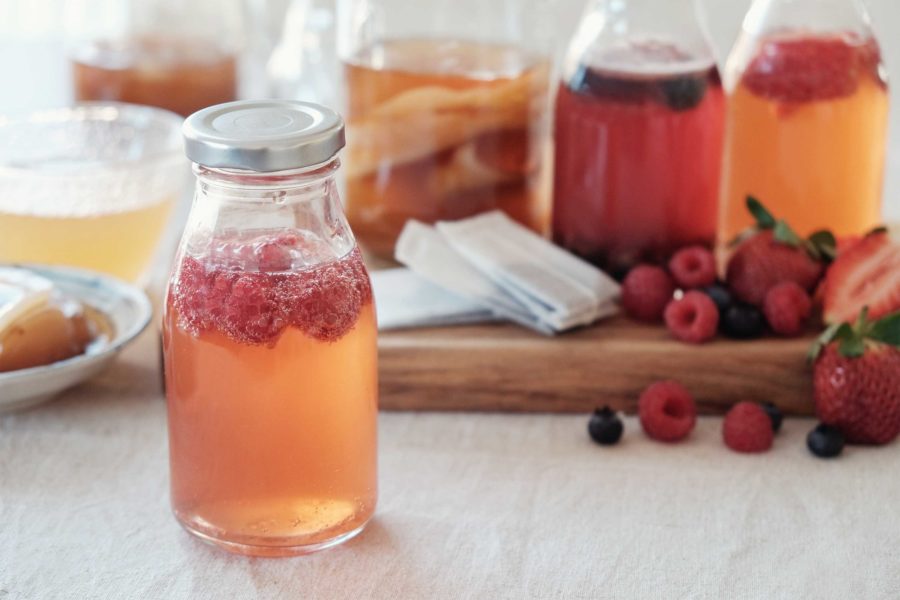Kombucha: You’ve heard its name, you’ve seen it in the cooler section of grocery stores and convenience marts. You’ve heard about different flavors and various health benefits. You may have even confused a bottle for an average iced tea.
And, yet, you may still not be sure exactly what kombucha is.
Well, it’s time to demystify this mysterious tonic. It’s not the stuff the Brits drink every afternoon, for sure. We’ve got the lowdown on kombucha, how it’s made, its health benefits, and the best ones brewed right here in New England.
What is kombucha?
First things first. Kombucha is a fermented drink made with tea, sugar, bacteria and yeast. Because of its fermentation process, kombucha does contain alcohol, but most bottles sold in stores contain less than 0.5 percent alcohol.
It also contains caffeine (derived from the tea it’s made with), vinegar, B vitamins, amino acids and enzymes. There is also live bacteria believed to serve as a beneficial probiotic supplement.
Kombucha originated in China in 220 BC. In 414 AD, a doctor named Kombu introduced the fermented tea to Japan. From there, it eventually made its way to Europe via 20th-century trade routes.
What are its health benefits?
Some kombucha proponents claim lofty benefits, including disease prevention, anti-aging and energy improvement. There is no hard scientific evidence to back this up, although the caffeine it contains will add pep to your step.
What does show promise and is actually backed by science are the benefits of ingesting live culture, as you would with yogurt, to aid the body in gut health, digestion and immunity.
Consumers should be wary of home-brewed kombucha, in which bacterial contamination is more likely to occur due to non-sterile conditions
What does it taste like?
Kombucha generally tastes like a fizzy tea with a slightly vinegary flavor. There are various iterations on the market, though, that have added fruity or herbal notes with a subtle sour or tart aftertaste.
Where can I get some?
New England is hopping with local kombucha tea brewers.
KrafTea Kombucha
This local Massachusetts company out of Worcester makes its kombucha with fresh ingredients such as ginger juice, organic teas and 100 percent fruit juice. It also offers the maximum amount of beneficial vitamins and probiotics in its formula, as it does not modify or filter its kombucha after its initial fermentation. It also makes for a light alcoholic treat at 2% ABV.
Katalyst Kombucha
Katalyst Kombucha came out ahead of the kombucha craze when it began concocting fermented tea back in 2005 in Greenfield, Mass. Today, it uses exotic ingredients such as organic blue-green algae and organic cordyceps mushrooms, as well as jasmine green tea and house-made ginger juice.
Urban Farm Fermentory
Proudly undiluted and made locally, the kombucha made at Portland, Maine’s Urban Farm Fermentory is created with organic green and black tea and evaporated cane sugar. Colonies of bacteria and yeast give it a natural alcoholic content of 1.5% ABV. Enjoy at its tasting room or flavored bottles including ghost chili pepper, elderberry, toasted oak and chaga chai.
Aqua ViTea Kombucha
Husband and wife Jeff Weaber and Katina Martin come from beer brewing and holistic medicine backgrounds respectively. This makes them the perfect duo to create probiotic-rich Aqua ViTea Kombucha out of Middlebury, Vt.
In fact, Jeff first made this one at home. Through the use of the latest industrial technology, the Weabers are able to extract alcohol from their formula. So, they can guarantee a truly non-alcoholic kombucha tea.



 2 min read
2 min read


